It was a case of two steps forward, one step back on climate action last week.
The passage of the Albanese government’s Climate Change Bill through the House of Representatives was a major milestone.
With the Greens supporting the legislation, and the government welcoming amendments from both the Greens and Teals, this Parliament is showing a maturity that was missing in 2009, when the Rudd government’s carbon pollution reduction scheme was rejected by the Senate.
The enshrining of an emissions reduction target of 43 per cent from 2005 levels by 2030 and net zero by 2050 is now certain.
In the United States, President Joe Biden won the support of all 50 Democrat senators to pass his cutely named Inflation Reduction Act, which promises a 40 per cent emission cut by 2030. Among a raft of health and tax measures, the Bill includes US$369 billion for renewable energy generation, as well as US production of wind turbines, solar panels and batteries. Subsidies for electrical vehicles will also be provided.
The legislation will now head to the US House of Representatives, where it is likely to be passed by the Democrat majority.
To tackle emissions to date, both Australia and the US have largely relied on regulation, as well as pressure on corporates from stakeholders, including employees, consumers and ESG / impact investors. But, the codifying of targets and incentives is designed to provide industry with the confidence needed to drive further investment and accelerate emissions reduction.
Despite these big steps forward on the domestic front, news of the suspension of collaboration between China and the US on issues including climate change is a major blow.
If we have any hope of keeping global warming to the 1.5 degrees specified in the Paris Agreement, as well as achieving other sustainable development goals in the United Nations’ 2030 Agenda, we can’t afford backward steps like this.
This article was also published in The West Australian.
 ReGen Strategic
ReGen Strategic